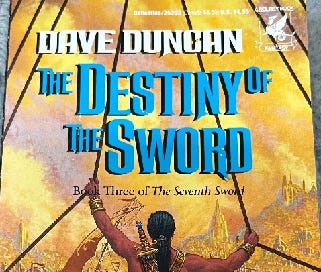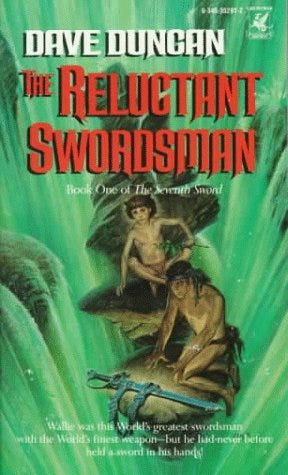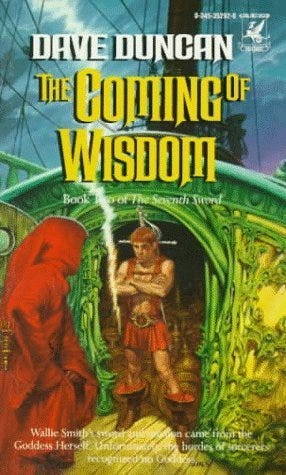Fantasy and Progress Book Club: The Seventh Sword
Lessons on Techno-Optimism from Unlikely Places
Today I'm introducing a new occasional feature in Changing Lanes: the Fantasy and Progress Book Club.
One of the themes of this newsletter is Progress and Techno-Optimism. Here we believe that the future can be better than the past, and for everyone, not merely a few. We also believe that the key to progress is rationalism and science: not only abstractly, as mental disciplines, but also in their applied form, that is, technology introduced at scale.
If we were to put genre fiction’s attitude towards these ideas on a spectrum, we’d find that at one end of it we’d have science fiction, which is usually excited by progress, rationalism, and (naturally) science. In the middle, we’d have crime fiction or romance, which are mostly indifferent to these subjects. And at the other end, we’d find that the fantasy genre considers them pernicious.
Almost all Western fantasy rises from the foundation that Tolkien laid, and he had little use for technology and industry. In The Hobbit they are goblin work, while in the Lord of the Rings they are the "devilry of Orthanc". They are the foulest tool of the rogue wizard Saruman; they are the despoiler of Isengard and the scourge of the Shire. Tolkien's heirs usually follow his lead, making their fantasies a refuge from industrial civilization, as in the Thomas Covenant books, or a precursor to it, as in The Wheel of Time. In either case, the fantasy world is deliberately a riff on medieval pre-modernity. It is the antithesis of our own world.
That’s why fantasy novels that engage directly with the ideas of progress and techno-optimism are worth reading. Because the conventions of the fantasy genre, unlike those of science fiction, are usually deployed against these ideas, when the genre chooses instead to promote them, the engagement has power and freshness.
To inaugurate Fantasy and Progress Book Club, we'll begin with the best example I know: Dave Duncan's trilogy, The Seventh Sword.
Meet Dave Duncan
Dave Duncan had an unconventional entry into the world of professional writing. After a 30-year career as a geologist and petrochemical specialist, Duncan made his first writing sale at the age of 53. This late start didn't hinder his productivity; before his death in 2018 at 85, he had written more than fifty novels. With such a prolific output, there were certainly low points as well as high ones, but he hit high very often.
In his early years, Duncan wrote both fantasy novels and hard science fiction, but as time passed he wrote more of the former. I asked him about this change once, and he was frank that he preferred writing SF but fantasy sold better, so he wrote what the market demanded.1 In the latter third of his career, he embraced self-publishing, which allowed him several freedoms. When he wrote fantasy then, he tended to write standalone stories, not multi-book series, and he returned to his preferred genre of science fiction, writing some of his best late-career books.
What sets Duncan apart is that he was a writer of rationalist fiction. Eliezer Yudkowsky wrote a pioneering text in that genre, the fanfic Harry Potter and the Methods of Rationality, of which he wrote: "The text contains many clues: obvious clues, not-so-obvious clues... and massive evidence left out in plain sight. This is a rationalist story; its mysteries are solvable, and meant to be solved." Decades earlier, and consistently throughout his career, Duncan wrote in the same fashion. His stories featured smart protagonists who reasoned their way out of problems, but were not so smart that they always reasoned well. Readers got the benefit of seeing not only the ways rationality helped solve problems, but close-up views of how, and why, it could go wrong.
While fiction has no shortage of smart protagonists, that intelligence is too often asserted rather than proved. Duncan’s books prove it, and in their way, teach their readers to be intelligent too.
The Seventh Sword
The Seventh Sword trilogy holds a special place in Duncan's bibliography. It consists of three novels: The Reluctant Swordsman; The Coming of Wisdom; and The Destiny of the Sword.
This was the first story he began writing while still working as a petrochemical engineer, and even after he found success as an author, he kept it in reserve to polish; the first book of the trilogy was his sixth published work. It outsold everything he ever wrote for hire, and later, when the rights reverted to him and he could sell it through his own publishing imprint, it outsold all of his other work. Duncan himself considered it his greatest professional achievement, albeit with a tinge of regret that what his fans considered his best work came so early in his career.
So what story did this middle-aged petrochemical engineer find so compelling that he had to write about it?
Why, the story of a middle-aged petrochemical engineer who is transported to a fantasy world where he becomes young and virile.
Stating the story's setup this way sounds very embarrassing. But readers willing to take a chance will find that this setup is crucial to the story Duncan wants to tell.
Earth does not appear at all in the story of The Seventh Sword. The series is set entirely in the World of the Goddess. Like Philip Farmer's Riverworld (surely an inspiration), there is one River which flows everywhere, the dominant physical feature of the World. There is agriculture, and mining, and forestry, and trade, but all of these things happen near the River, and all of the World's cities are on its banks. Unlike Middle-Earth or Toril, the World is home to only one intelligent species, the People; unlike our Earth, the People have only a single ethnicity, language, and culture.
That culture has strict codes. One of these is that every adult is a member of a craft: farmer, sailor, trader, builder, and so forth, each with its own secret oral tradition in which its wisdom is contained. Mastery of this wisdom is reflected in rank. There are seven of these, from novice Firsts, to adequate Thirds, through capable Fifths, up to the Sevenths, the superlative masters. And the most important and prestigious craft is 'swordsman'.
To the temple of the Goddess comes Shonsu, a swordsman of the Seventh, and as such one of the most powerful people in the World. All must obey him without question, except perhaps another swordsman; but the code of their craft insists that their disputes be resolved through single combat, and in such a contest Shonsu is invincible. As befits the World's mightiest man, Shonsu was charged by the Goddess with a great quest. He failed in that quest, and was cursed; he is haunted by a demon. The priests attempt to exorcize this demon, but they fail as well. The demon drives out Shonsu's mind and takes possession of his body. The demon then introduces himself to the astonished priests as Wallie Smith, of Earth.
The last thing Smith remembers is succumbing to encephalitis in hospice care. Surely the World is all a dream of his dying brain. So is the World just his fantasy? If so, it speaks poorly of him. He's embarrassed to discover that, apparently, his deepest desire is to imagine himself young and virile. Is he that insecure? Worse that he would imagine such a World as this. It's got barbaric grandeur, to be sure, but its culture is thoroughly that of Earth's Iron Age. There's no literacy, indeed no writing at all; slavery is commonplace; and the World's culture is dominated by priests and swordsmen, the latter being a warrior caste that exploits everyone else. Like Thomas Covenant, the protagonist of another “contemporary Earthman who goes to a fantasy world” story, he rejects the whole thing as a demeaning fraud and refuses to participate.
Unlike Thomas Covenant, he meets a god, who makes it very clear to him that the World is real. Shonsu's quest was important, so important that his failure can't be permitted to stand. Wallie Smith was, in the god's word, "available", so he has been rescued from death to do what Shonsu could not. Appropriately humbled by divine intervention, Smith agrees to take up his predecessor's quest. And what is it, exactly? The god hedges; Smith will find out in due course.
Readers find out in the second book that the answer is sorcerers. From their fortresses hidden in the mountains, sorcerers have come down to the River, to conquer the cities of the World, and to slay the swordsmen, whom they hate. Sorcerers have fearsome powers: invisibility, mind-reading, and the power to kill from a distance using thunderbolts, fire demons, or even a few notes of music. Smith's quest, it seems, is to drive the sorcerers back, and make the World safe for swordsmen.
The Twist
(If you haven't read these books and are sufficiently intrigued, this is the place to set this review aside and come back later.)
Smith is willing to do what the god asked him to do, but he's troubled by it. He has Shonsu's body, but he's kept his own mind, the mind of a 20th-century Earth engineer, which makes him particularly ill-suited to do what must be done. Swordsmen have honour, the product of a shame culture; Smith has consequentialist ethics, the product of a guilt culture. That disconnect means he keeps making blunders no real swordsman would ever make, like avoiding bloodshed or treating slaves as human beings. These missteps make his quest harder to fulfill, because they make his fellow swordsmen fear and mistrust him. Worse, he can't help but notice that while the sorcerers are aggressive towards swordsmen, towards everyone else they are reasonably benevolent. They are certainly better at governing than the swordsmen are.
So, Smith wonders, why was he given this task? He's uniquely bad at it, and more in sympathy with his opponents than his allies. Late in the second book, the answer arrives. He was given this task because the sorcerers are not magicians after all: they're technologists.
Sorcerers don't wield thunderbolts, they wield pistols. They don't read minds, they send messages by homing pigeon. Above all, they are literate, the only literate people in the World. They closely guard this secret because of all the benefits that literacy gives them: experimentation and record-keeping, communication at a distance, and cumulative knowledge. Like Batman, they use theatricality and deception to overstate what they can do and overawe others, but behind their cowls they aren't wizards, but Renaissance-level scientists.
This revelation leaves Smith with an even greater dilemma. No Worldly swordsman could hope to understand the sorcerers' abilities well enough to defeat them, but an Earthly engineer might. That's why this quest was given to him... but, knowing what he is to do, does he still want to do it? As an engineer, he believes in technology and progress as forces that can make the World better. But crushing the sorcerers will foreclose that opportunity. If he does so, he'll usher in a permanent Dark Age.
Beyond the Twist
I will end the plot summary there. To find out how Smith resolves this dilemma, you will have to read the books. And even knowing the second book's Big Reveal, you will still find many revelations in store. Each book in the trilogy features a dramatic plot twist that, in good rationalist fashion, forces readers to reevaluate everything they've read up to that point. I will not spoil the surprises in the first and third books, which are masterfully set up, in plain sight yet impossible to foresee.
There's more to fiction than plot, of course. Duncan's world-building is excellent. The World of the Goddess is alien yet feels vividly real, especially with Smith as a viewpoint character to draw attention to its unique features. Duncan's writing is strong throughout. Action sequences have an edge-of-your-seat immediacy, both the physical ones and especially the social ones: the cut and thrust of political combat, where opponents try to win over fickle crowds, are particularly well done.
There are a few things that take us out of the well-crafted world. Earthly idioms like "I rest my case" or "sex life" or "star billing" occasionally pop up, detracting from the verisimilitude, and too often the narrative grinds to a halt to indulge Duncan's fascination with the sexiness of his female characters. But these missteps are more than offset by his gift for making complex ideas accessible through narrative, without pandering or heavy-handed exposition.
And while The Seventh Sword works brilliantly as an adventure story, there are indeed complex ideas at hand, which is why I'm reviewing the series in this newsletter about innovation and progress. The central theme of The Seventh Sword is one Duncan touched upon at length over his writing career: that the recurring failure mode of human society is the warrior caste.
I don't know if Duncan read Mancur Olsen or James Scott, but he seems to have agreed with them that nobles who monopolize violence function as "stationary bandits", using their power not only to keep order, but also to enrich themselves at the expense of everyone else. The Seventh Sword has much to say about how such castes emerge, the dangers they offer, their relationship to technology, and the ways in which they are predictably irrational.
I recommend The Seventh Sword to readers of this newsletter. You will come away having enjoyed a fast-moving adventure, the sort of thing that genre fiction aims to provide. This adventure in particular features a smart protagonist. You can follow Smith's reasoning throughout, and while he's often right, he's occasionally wrong. But when he is wrong, he revisits his failed trains of thought, teaching us readers to reason better ourselves. Finally, you will have gained, through the immediacy of fiction, a primer on the importance of progress, the value of technological change in bringing it about, and the dangers that that change can produce.
That is what I find most interesting about The Seventh Sword. Duncan began writing this story in the 1980s, and published it in the 1990s, intending it to speak to that age. We live in different circumstances: facing, on the one side, the Great Stagnation in progress and technological advance, and on the other, the looming promise and problem of artificial intelligence. Smith's dilemma is to determine how to overcome social and cultural inertia with new technology, without doing massive damage in the process. That is also the dilemma of our time, making The Seventh Sword more relevant than ever.
Respect to Rob Tracinski for feedback on earlier drafts.
Thanks for reading Changing Lanes! Please let us know how we’re doing by answering the poll below. And if you’d like to respond to this post, please leave a comment.
We corresponded around 1999, when the Internet was new and authors still found it reasonable to be available to fans via e-mail. I regret now that those letters have been lost, vapourized in some long-defunct account.








I finally finished these! Thanks for the recommendation, they were pretty good
Following up on your words early on in this essay, "If we were to put genre fiction’s attitude towards these ideas [which are, Progress and Techno-Optimism] on a spectrum, we’d find that at one end of it we’d have science fiction, which is usually excited by progress, rationalism, and (naturally) science."
Comment: Isn't there a dystopian streak found in some science fiction? A world or universe that has turned out very badly because of technology gone awry? I just scanned the web and found https://www.masterclass.com/articles/what-is-dystopian-fiction-learn-about-the-5-characteristics-of-dystopian-fiction-with-examples In our shared field of vehicle automation I think there is a novel available where the cars autonomously turn against us humans.
But you are writing about a different, perhaps dominant branch of the genre... is dystopian science fiction a small sliver?